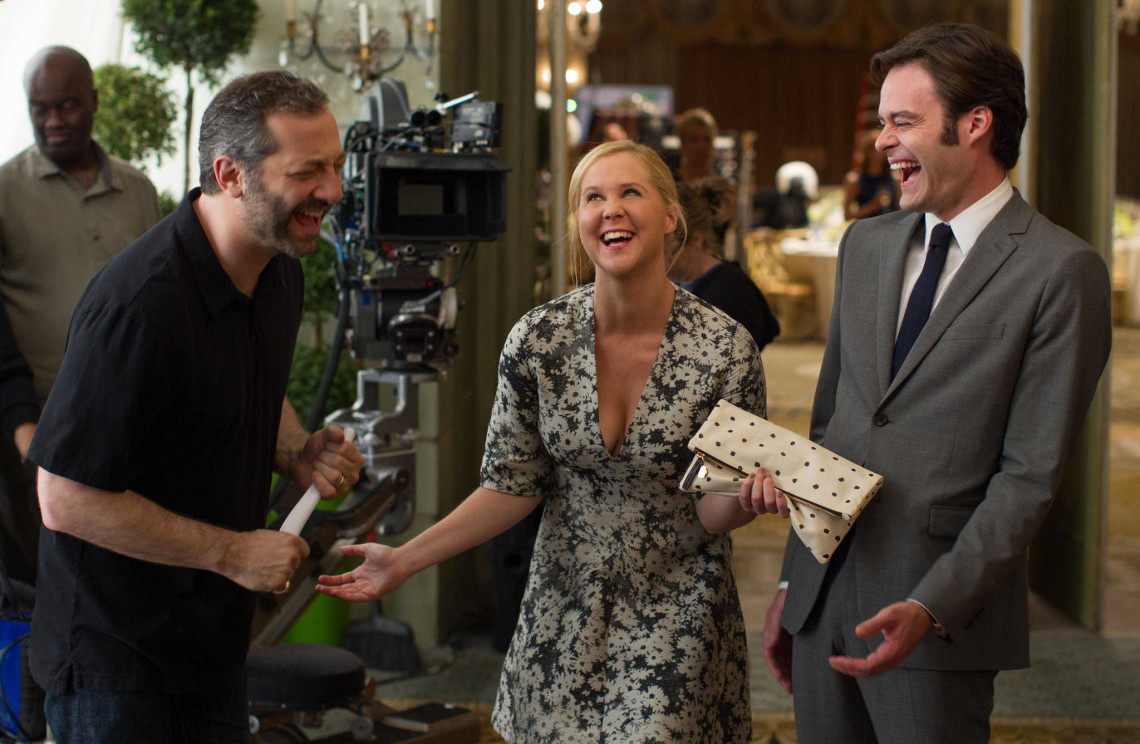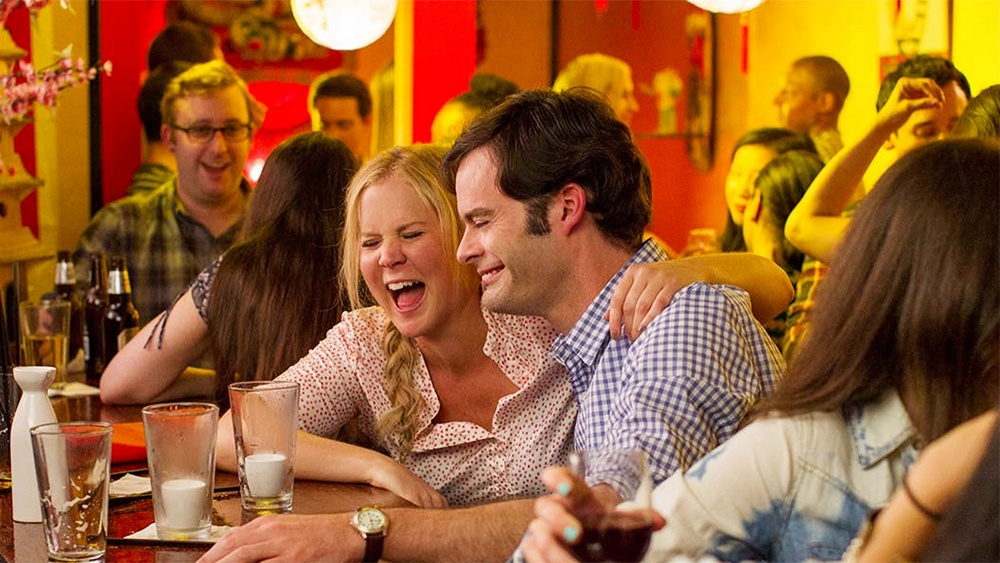Like the Pacific Theater in World War II, America’s literal movie theaters have become the site of crucial battles in the cultural war for womankind’s dignity and agency. With every new month’s slate of releases, we get a wave or two of incisive assessments over the legitimacy of the texts’ feminist content, condemning the films that misrepresent or unfairly omit women and championing those that support them. Three current films gladly provide the thinkpiece-industrial complex with plenty of fuel, and that surge shamelessly begins here.
While cultural commentators continue to vaunt Strong Female Characters™, a handful of releases provide reason to positively note depictions of vulnerability ensconced within that strength. Specifically, the likes of Trainwreck, Mistress America, and The Diary of a Teenage Girl all highlight the importance of failure and dysfunction in personal development. These three films span disparate milieus, but are united in their understanding that the truest woman is not perfect. They privilege the real over the ideal, allowing women the space to strive and struggle, to fail, and ultimately, to learn. Forget Strong Female Characters; this summer has played host to a trio of richly flawed Realistic Female Characters.
Amy Schumer and Judd Apatow’s Trainwreck became an incendiary talking point last month when a shooter opened fire at a showing in Lafayette, Louisiana, killing two before taking his own life. The shooter’s violent spree was tied to his vocally misogynist attitudes in no small way; as Schumer herself has noted, it’s not coincidence that he chose a showing of Trainwreck as the scene of his massacre. He was no doubt agitated by the film’s freewheeling approach to female identity, as it unabashedly shows Schumer’s comic persona in her natural habitat—that is to say, wasted and on the prowl for D. The Amy that appears onscreen goes through her life with a hunger for blind consumption, whether that means slugging down shots, sneaking out of a banquet hall for a quick draw from her one-hitter, or scaling the rotation of club-rats she brings home like they make up the Matterhorn. In the film’s final act, Apatow’s streak of social conservatism comes into conflict with Schumer’s gleeful vulgarity, making the unsavory suggestion that the character’s weakness for vice has roots in her own self-loathing. But all the while, the film grants Amy the most basic benefit of the doubt. Even when she’s screwing around with someone she shouldn’t or pushing away the affections of an upstanding suitor, the film makes it clear that through these acts, she’s simultaneously expanding and growing as a holistic entity. Apatow may make the questionable assertion that Amy’s behavior is symbolic of a defect of character in its later scenes, but even that can’t detract from the emotional generosity of this portrayal of a woman doing her best in a confusing world.
It’s a distaff script-flip for the glut of coming-of-middle-age comedies for schlubby male comedians. Marielle Heller’s adaptation of the graphic novel bildungsroman The Diary of a Teenage Girl upends its source material once more, setting it in reverse until it more closely resembles an origin story for Trainwreck’s Amy. The film tracks Minnie’s grand debut into adulthood, and all of the attendant indulgence and difficulty that implies. Minnie begins by getting her first taste of sexuality from her mother’s boyfriend, the buff-but-lanky Monroe (True Blood alumnus Alexander Skarsgard), and goes into a feeding frenzy shortly afterward. Like the kid in the proverbial candy store, 15-year-old Minnie sees erotic potential everywhere she goes — teenybopper hormones haven’t been this torturous since Ghost World.
Through both her dilapidated mother (Kristen Wiig, showing rare depth) and a panoply of experimental experiences, Minnie learns that sex appeal lends a woman great power, but like the Spider-Man of fucking, it also imbues her with great responsibility. Fellating a stranger in a back alley may feel like a daring thrill while it’s happening, but Minnie learns the hard way that adventures in horniness also hold the potential to leave their participants hurt, or worse, numb. Diary and Minnie alike revel in the throes of a girl’s first brush with honest sex appeal, and gradually shed their respective naïveté to match. Minnie comes to realize all of the potential for agony as well as ecstasy in sex — in this respect, she both is and is not a role model. She’s the product of an after-school special, sans the heavy filter of pearl-clutching bullshit. She arrives at several essential life lessons over the course of the film, but as the audience leaves her, she shows no signs of slowing up. Heller assures the viewer that Minnie will continue to screw and screw up, and that defects in judgment are part and parcel to mature life.
Noah Baumbach’s latest wisp of effervescence, titled Mistress America, shifts focus away from sexuality, but promotes the same notion of productive failure. Baumbach’s new film deals a twofer of womanly works in progress with Lola Kirke and Greta Gerwig as a Columbia freshman and her newly-minted thirty-something stepsister. Both women have landed in transitional junctures in their respective lives: Kirke’s character must navigate the social minefield that is college while getting acclimated to the biggest of big cities, and Gerwig has weathered a nasty breakup and failed business ventures. Gerwig, in particular, embodies the spirit of unrepentant dilettantism; her self-described autodidact balances dreams of restaurant ownership with a day job as a SoulCycle instructor, freelance interior design work, a fledgling music career, and a generalized artiness about her. Kirke, too, wrestles with personal stasis as she tumbles into a crush on her platonic classmate and copes with rejection from the university’s uberexclusive writers’ society. Both women own their incompleteness, tackling each stymied romantic and professional opportunity as a teachable moment. They find solace in one another, and, like Minnie and Amy, within themselves.
The sum total of these films is a bold statement hidden within an un-bold statement: women, cinematic figments or no, are human beings. The freedom to fail is a privilege that cinema’s male characters have taken for granted since the medium’s inception, as commendably pro-women movies put on a brave face by crafting unshakably strong characters. They laid important groundwork, but the summer of 2015 has seen an advancement to the next step of womankind’s forced reclamation of onscreen agency. Once we’ve accepted that women can do anything just as well as a man can, we can collectively move on to respecting them even when they don’t.



















